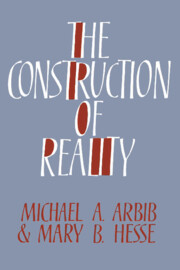Book contents
- Frontmatter
- Contents
- Preface
- Chapter 1 Posing the problem
- Chapter 2 The intelligence of the artificial
- Chapter 3 Schema theory
- Chapter 4 Relating mind and brain
- Chapter 5 Freedom
- Chapter 6 Freud on psychology and religion
- Chapter 7 Schemas: from the individual to the social
- Chapter 8 Language, metaphor, and a new epistemology
- Chapter 9 Interpretation and reality
- Chapter 10 Religions as social schemas
- Chapter 11 The Great Schema
- Chapter 12 Secular schemas
- References
- Author index
- Subject index
Chapter 3 - Schema theory
Published online by Cambridge University Press: 22 September 2009
- Frontmatter
- Contents
- Preface
- Chapter 1 Posing the problem
- Chapter 2 The intelligence of the artificial
- Chapter 3 Schema theory
- Chapter 4 Relating mind and brain
- Chapter 5 Freedom
- Chapter 6 Freud on psychology and religion
- Chapter 7 Schemas: from the individual to the social
- Chapter 8 Language, metaphor, and a new epistemology
- Chapter 9 Interpretation and reality
- Chapter 10 Religions as social schemas
- Chapter 11 The Great Schema
- Chapter 12 Secular schemas
- References
- Author index
- Subject index
Summary
Our task now is to develop a theory of human knowledge that makes contact with the AI concepts and the notion of the embodied subject of the previous chapter. We call this approach schema theory, and have already outlined its features in Section 1.3. We provide our view of the current shape of schema theory as a scientific discipline within cognitive science and also point to ways the theory must develop if we are to use it in addressing such issues as freedom, the person in society, and the possibilities of religious knowledge. We stress that schema theory is not a closed subject, nor is there any consensus as to what constitutes its current status. Even the notion of a “schema” as “intermediate functional entity” in cognitive processes is not fully delimited but will evolve with developments in cognitive science.
Our approach to schema theory denies language the primary role in cognition. True, with language “in place,” we seek to understand its substrates, both within the human brain and in the social nexus. But when we take an evolutionary or developmental view, language is no longer primary. Even though as adults we are immersed in language, we seek to burst the bounds of language to construct a richer epistemology. Schema theory seeks to mediate between the billionsfold complexity of neurons and the thousands-fold complexity of words.
- Type
- Chapter
- Information
- The Construction of Reality , pp. 42 - 62Publisher: Cambridge University PressPrint publication year: 1986
- 7
- Cited by



